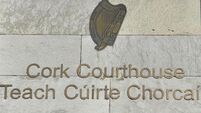‘Lack of multi-denominational schools subverts human rights’, says Cork principal

Cork enrolment figures suggest that demand is high for multi-denominational schools
As calls have been made for more multi-denominational schools, a Cork principal has said that the current system of opt-out of religion classes in primary schools is undermining fundamental human rights.
There are 13 multi-denominational primary and 12 secondary schools in Cork, compared to 307 Catholic primary and 46 secondary schools; 19 Church of Ireland primary and three secondary schools; and 24 inter-denominational secondary schools, the latter a mixture of Catholic and Church of Ireland.
However, Cork enrolment figures suggest that demand is high for multi-denominational schools. Some 10,283 students attend just 25 multi-denominational schools, meaning there is an average of 411 pupils per school, whereas 99,461 pupils attend a religious school — an average of 249 pupils per school.
The Government has set a target of increasing the number of multi-denominational primary schools nationally to 400 by 2030, with Cork city-based school principal Colm O’Connor saying: “We’ve no hope of reaching the 400 schools, but it’s also an arbitrary number — we need to start from the point of view of fundamental rights.”
The teaching of religion has been reduced by half an hour a week to two hours, but schools can teach religion for longer if they wish to under new “flexible time” outlined last year in the NCCA’s Revised Primary School Curriculum Framework.
Mr O’Connor explained this reduction still means that children whose parents opt them out “will continue to sit in shame at the back of the class for 8% of their primary school lives, or approximately six months of teaching time.”
“Six full months of school time sitting at the back of a class is longer than the covid closures. That’s the scale of lost tuition time, but it’s also shame time,” he said.
“Six months of shame time, most parents won’t put their kids through that, so that’s the coercion. They’re only not opting out because there is no effective opt-out alternative — the whole debate is starting from the wrong position.
“The humiliation of these very young children undoubtedly acts as a deterrent to a larger group of parents who might also prefer that their children study a general ethics course.
“Whether they recognise it or not, these parents are experiencing a form of coercion, as fundamental rights should be easy to access and without the need for justification, or the need for significant effort or risk.”
He added that “it remains acceptable — even foreseen — that religion would influence secular subjects such as history, geography, and science. This is unconscionable in a modern republic.”
“The right to the freedom of conscience and the right not to be indoctrinated are fundamental rights, guaranteed not only by the Constitution, but also the European Convention on Human Rights, to which Ireland is a signatory. These rights are infringed in the vast majority of our State-funded schools.”
Mr O’Connor called for the minister for education to consider the Ombudsman for Children’s Office 2017 report, which stated: “In order for Ireland to comply with its international human rights obligations, a long-term goal should be the removal of denominational religious classes from State-funded schools.”
A spokesperson for The Department of Education told The Echo: “The manner in which any school ensures that the right to opt out of religion instruction classes is upheld, is a matter for the particular school concerned.”
They added: “Education about Religious Beliefs (ERB) and Ethics is being considered as part of the new Social and Environmental curriculum specification set for the primary level.”
The Department is working on a survey which will ask parents their preferences on school patronage, they said, adding: “Parental demand will be the key driver in meeting the programme for government target of 400 multi-denominational primary schools by 2030.”







 App?
App?


